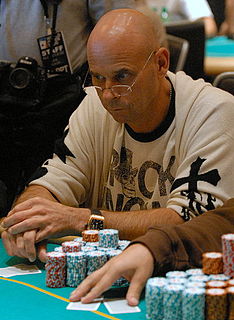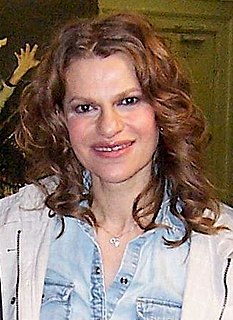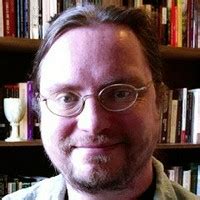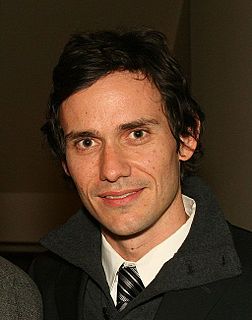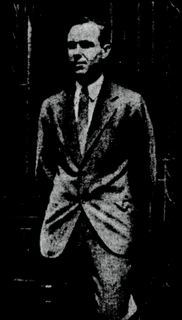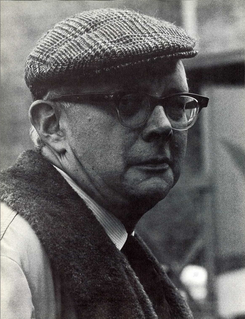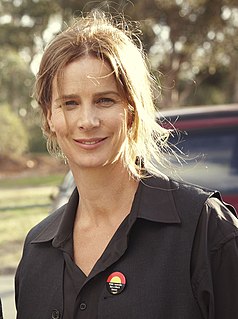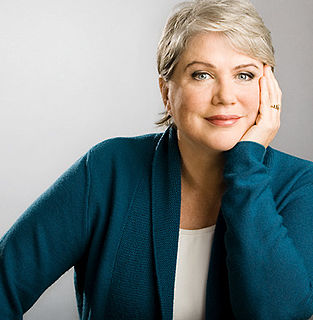Top 165 Humanist Quotes & Sayings - Page 3
Explore popular Humanist quotes.
Last updated on April 15, 2025.
People find it difficult to call Lars' movies feminist. But they're humanist movies because they show a woman going through life and being in really awful situations and going through hell, especially in films like 'Dogville' or 'Breaking the Waves,' but they stand their ground and they stay who they are, and I think that's empowering for anyone.
Absolutists frighten me. During all the endless discussions on my blog about evolution, intelligent design, God, and the afterworld, numbering altogether thousands of comments, I have never named my beliefs, although readers have freely informed me that I am an atheist, and agnostic, or at the very least a secular humanist - which I am.
About belief or lack of belief in an afterlife: Some of you may know that I am neither Christian nor Jewish nor Buddist, nor a conventionally religious person of any sort. I am a humanist, which mean, in part, that I have tried to behave decently without any expectation of rewards or punishments after I'm dead.
I'm a humanist. I always believed, even with Cirque du Soliel, that this is my way to contribute to a better world. I believe I'm very privileged, but many people face the reality when they wake up in the morning of not having food or a glass of water. Life's been good to me, and I believe you have to feed the circle of life.
It's no understatement that the church has done a poor job in teaching our young people that reason and faith are not opposites, and that atheists are far from being on the side of reason. You can find on our website a chart which I use to demonstrate the various worldviews work out, and which one, Christianity, is rational. Many kids, however, who grow up huddled in a Christian environment find themselves in the university setting completely unequipped to defend the rationality of the Christian faith against the secular humanist worldview so prevalent on college campuses.
There is humanist enterprise of the book, and amongst that there are many, many stories. And that is why at the end, when he says that the stories are so illuminating that they must be engraved and encased in gold and put in the palace library, the people who compile the book are telling us that this is a collection of human wisdom.
The trouble with being a secular humanist is that we don't have a congregation. We don't meet so it's a very flimsy tribe, but there's a wonderful quotation from Nietzsche. Nietzsche said, Only a person of deep faith can afford the luxury of skepticism. Something perfectly is going on. I do not doubt it, but the explanations I hear do not satisfy me.
The power of these recommendations is that they come from leaders representing a broad spectrum of religious conviction. At the table were people with Christian, Jewish, Muslim, Hindu, Native American and humanist perspectives, as well as individuals from advocacy groups ranging from the American Civil Liberties Union to the American Center for Law and Justice.
Albert Camus, a great humanist and existentialist voice, pointed out that to commit to a just cause with no hope of success is absurd. But then, he also noted that not committing to a just cause is equally absurd. But only one choice offers the possibility for dignity. And dignity matters. Dignity matters.
Our faith in democracy, personal freedoms and human 'rights', and the other comforting prescriptions of the humanist liberal credo stem from the supremacy of maritime over territorial power. Pragmatists may deplore this as crude determinism, as another vain attempt to construct a general theory of history. They should reflect on the sort of political philosophy and structures we might now adhere to had the Habsburgs, Bourbons, Bonaparte, Hitler, Stalin or his heirs prevailed in the titanic world struggles of the past four centuries.
For those who struggle with anti-pagan prejudices and stereotypes, Humanist Paganism might be a powerful educational tool. It can show that a pagan can be a sophisticated, cosmopolitan, and enlightened person, and that a pagan culture can be artistically vibrant, environmentally conscious, intellectually stimulating, and socially just.
Songs, a while ago, became the medium through which I process most of the information that I receive and feel. But I go back and forth about whether this is all of life or whether you're missing something important in living and whether or not, as a humanist, you're abnegating a certain responsibility if this - this art - is just where you are.
Absolute Evil is not the kingdom of hell. The inhabitants of hell are ourselves, i.e., those who pay our painful, embarrassing, humanistic duties to society and who are compromised by our intellectually dubious commitment to virtue, which can be defined by the perpetual smear-word of French polemic: the bourgeois. (Bourgeois equals humanist.) This word has long been anathema in France where categories are part of the ruling notion of logique. The word cannot be readily matched in England or America.
Christians believe that God created man, and humanists believe that man invented God. But whichever way you look at it, we're brothers and sisters. Either we're brothers and sisters because we're children of God, or because we've banded together to invent God. So the ethics of the humanist and the ethics of some Christians are very similar. And we don't want to create divisions between humanists and Liberation Theologians, any more than we want between the New Worker and the Trots. It's not helpful.
Publishing has gone very middlebrow. It's turned its back on legacy of modernism and gone into a humanist mode. When people go through art school they are exposed to the history of the avant-garde, and there's a general understanding that what you're doing as an artist is to a large extent, not just regurgitating that history, but engaging with it. There's this denial of that in the mainstream publishing world.
Families of privilege and money would have harps in their parlors, and their cultured daughters would learn to play. It's got such a strange history. But that wasn't the context that I learned it in, so the inherent friction between that history and the more humanist folk-y history wasn't in my conscience at all.
It was humbling to play Mark Ashton. He was a political activist and a humanist, and there is incredible conviction in his vision. But when you're telling a political story, humour is crucial; otherwise, it can be in danger of becoming a bit preachy, and the audience can feel like they've got an agenda coming full steam at them.
Only rarely do we see beyond the needs of humanity, and he linked this blindness to our Christian and humanist infrastructure. It arose 2,000 years ago and was then benign, and we were no significant threat to Gaia. Now that we are over six billion hungry and greedy individuals, all aspiring to a first-world lifestyle, our urban way of life encroaches upon the domain of the living Earth.
'The Marriage of Souls', like 'The Rationalist', is an exploration of humanist philosophy wrapped between the delicate leaves of an eighteenth-century tale. The story of the two novels - and they should be read as a two-volume work - centres around the old war-horse of boy meets girl, boy loses girl, boy finds girl. But what a boy and what a girl.
I am an atheist, out and out. It took me a long time to say it. I've been an atheist for years and years, but somehow I felt it was intellectually unrespectable to say that one is an atheist, because it assumed knowledge that one didn't have. Somehow it was better to say one was a humanist or agnostic. I don't have the evidence to prove that God doesn't exist, but I so strongly suspect that he doesn't that I don't want to waste my time.
If a humanist or an atheist or an agnostic says, "We'll bake you a pie," we can go right into the kitchen and bake it, and you can eat it an hour later. We don't promise you a pie in the sky by and by. It's charlatanry to promise people something that no one can be sure will ever be delivered. But it's even worse to offer people a reward, like children, for being good, and to threaten them with punishment if they're not.
For the Humanist, . . . head and heart . . . must function together. . . . The constitution of the Phillips Exeter Academy reads: 'Though goodness without knowledge . . . is weak and feeble, yet knowledge without goodness is dangerous. . . . Both united form the noblest character and lay the surest foundation of usefulness to mankind.'
Although I'm not Christian, I was raised Christian. I'm an atheist, with a slight Buddhist leaning. I've got a very strong sense of morality - it's just a different morality than the loud voices of the Christian morality.... I can't tell you how many films I've turned down because there was an absence of morality. And I don't mean that from any sort of Judeo-Christian-Muslim point of view. I'm not saying they're wrong and can't be made. But, fundamentally, I'm such a humanist that I can't bear to make films that make us feel humanity is more dark than it is light.
Each of us, even the lowliest and most insignificant among us, was uprooted from his innermost existence by the almost constant volcanic upheavals visited upon our European soil and, as one of countless human beings, I can't claim any special place for myself except that, as an Austrian, a Jew, writer, humanist and pacifist, I have always been precisely in those places where the effects of the thrusts were most violent.
There's not a big range in the political poetry of the last year, or not a political range. On the one hand, no poet that I know of who writes in English in the United States is anything but a humanist. So all poets, including myself, seem to be under that umbrella. We just don't have Rush Limbaugh poets, Ann Coulter poets.
Our humanist community should be thinking more about demonstrating the fundamental truth that goodness requires neither God nor the belief in God by organizing together as a community to do good. Less money spent on billboards that just make us feel good about ourselves and more on soup kitchens and organized visits to the sick and dying.
It's fantastic to believe, because they get so many benefits. I get mad at the atheist community when they put down believers because they put down religion so much. Now I am an atheist, but I don't like to describe myself with that term. I prefer secular humanist. But I do see first hand how beneficial religion is, for example if you are a refugee getting in a boat to take you across the Mediterranean, a belief in God is an advantage. I completely understand that comfort.
Incidentally, I am honorary president of the American Humanist Association, having succeeded the great science fiction writer and biochemist Dr. Isaac Asimov. John Updike, who is religious, says I talk more about God than any seminarian. Socialism is, in fact, a form of Christianity, people wishing to imitate Christ.
I am a humanist because I think humanity can, with constant moral guidance, create reasonably decent societies. I think that young people who want to understand the world can profit from the works of Plato and Socrates, the behaviour of the three Thomases, Aquinas, More and Jefferson - the austere analyses of Immanuel Kant and the political leadership of Abraham Lincoln and Franklin Roosevelt.
When people say to me, 'Why are you so good at writing at women?' I say, 'Why isn't everybody?' Obviously there are differences between men and women - that's what makes it all fun. But we're all people. There's a lot of good writers who are very humanist, but still manage to kind of skip fifty-five per cent of the race. And I just don't get that. Not to be able to write an entire gender? To me, the question isn't how do you do it? It's how can you possibly avoid doing it?
[Walt] Whitman and [humanist educator John] Dewey tried to substitute hope for knowledge. They wanted to put shared utopian dreams - dreams of an ideally decent and civilized society - in the place of knowledge of God's Will, Moral Law, the Laws of History, or the Facts of Science.... As long as we have a functioning political left, we still have a chance to achieve our country, to make it the country of Whitman's and Dewey's dreams.
We must realize that the Reformation world view leads in the direction of government freedom. But the humanist world view with inevitable certainty leads in the direction of statism. This is so because humanists, having no god, must put something at the center, and it is inevitably society, government, or the state.





